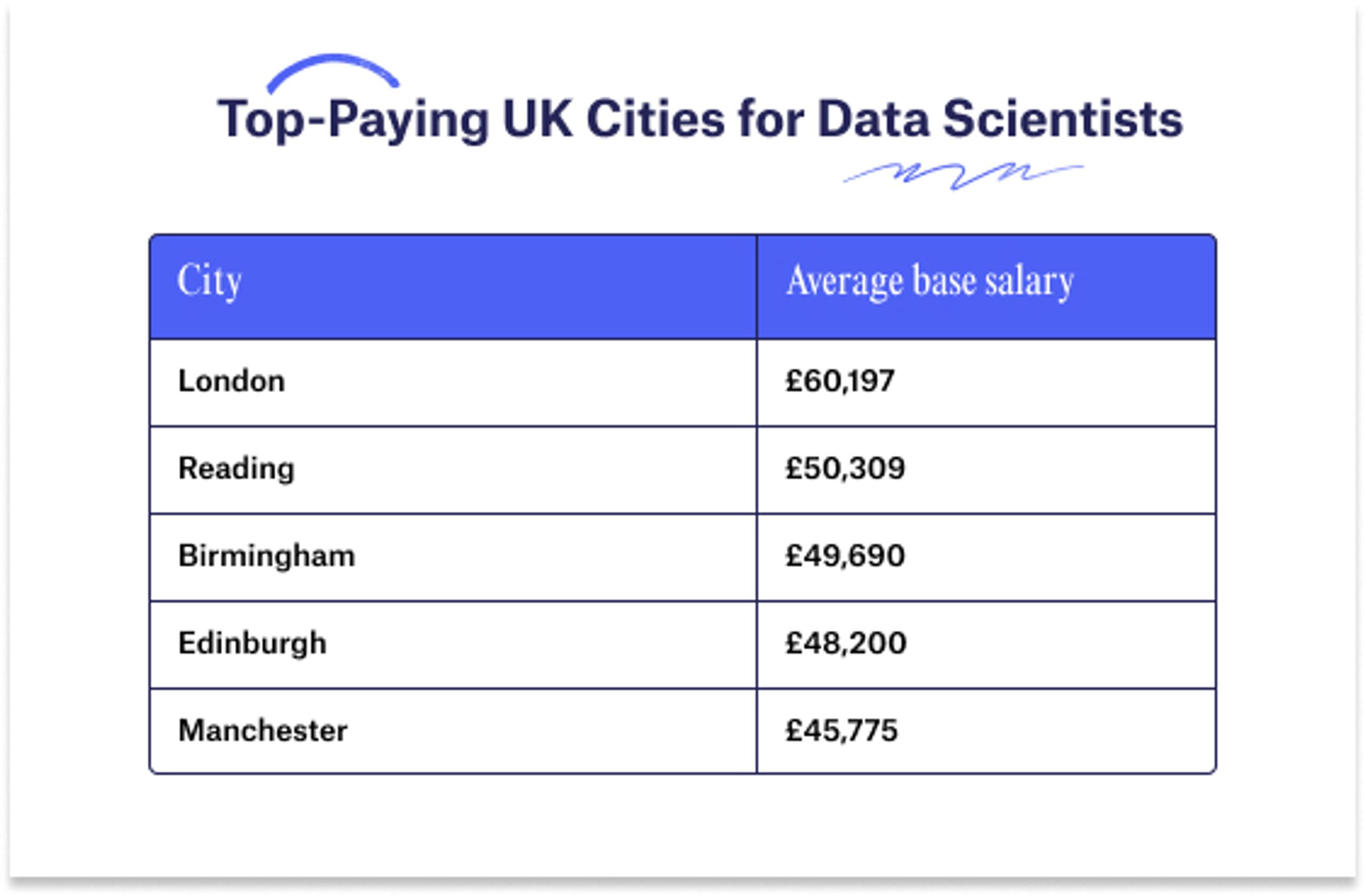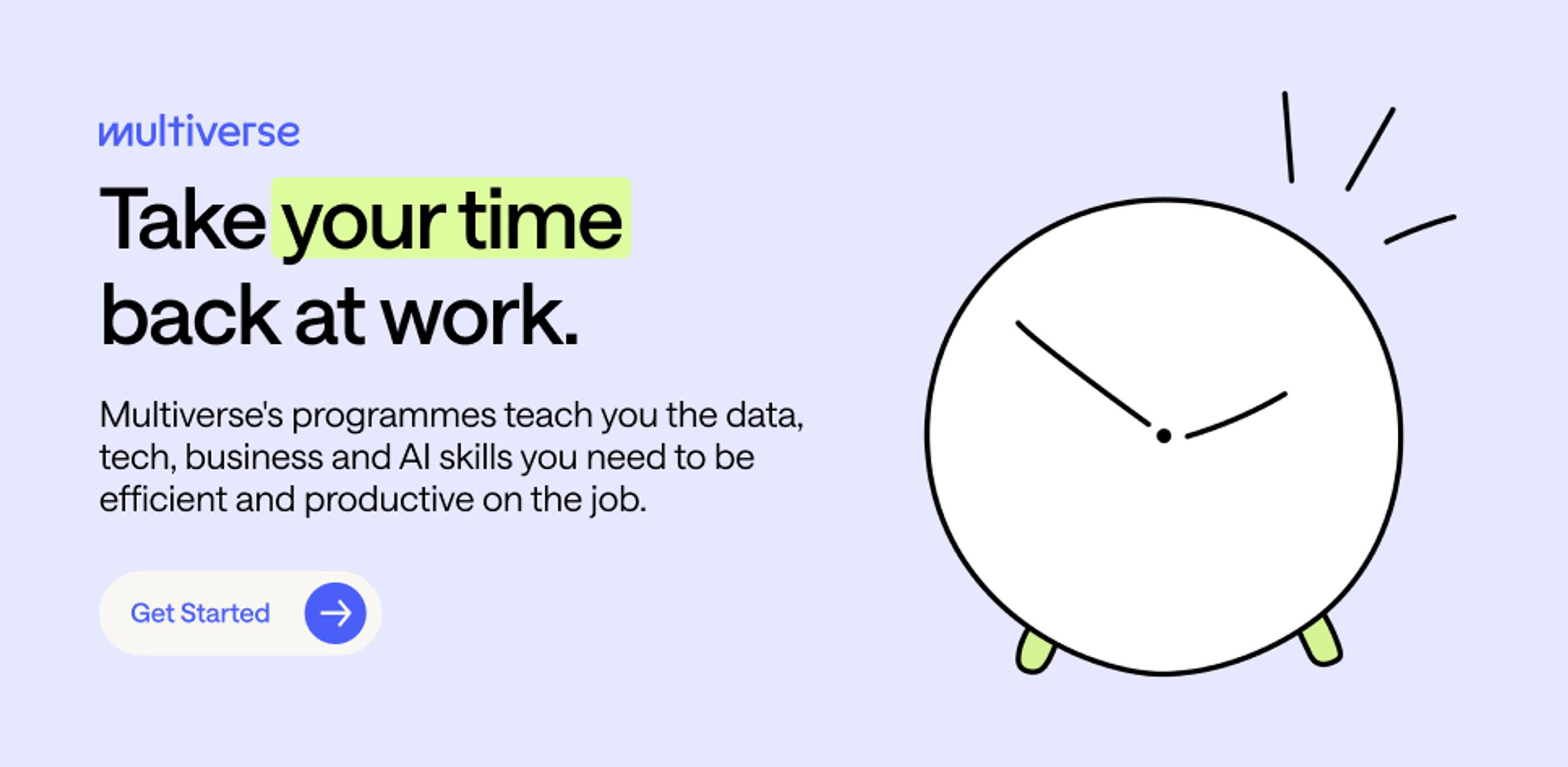Contents
If you want to start or progress within your tech career, there's never been a better time to explore data science. But what is data science? And is this career path right for you?
Data science may be a good fit if you have technical skills and enjoy spotting patterns. It's also an in-demand specialism that commands above-average pay.
A 2021 study(opens new window) estimated there were at least 178,000 unfilled data specialist roles in the UK. Cut to 2023, and the availability of employees with these skills still doesn't match the demand. Aside from being a high-growth role, the average Data Scientist's salary is on the higher end — even for entry-level roles. If that all sounds appealing, keep reading to learn more about this field.
What is data science?
Data science aims to uncover meaningful insights from data. As a discipline, it uses mathematics, statistics and computer programming practices to achieve this. People who work in data science must also understand technology like artificial intelligence (AI) and machine learning algorithms.
Companies rely on data science specialists to help them gather, clean and organise data so they can make sense of it. Organisations can then access the data insights needed to improve decision-making and enhance products. Data science also helps companies solve complex problems and find growth opportunities otherwise hidden in raw data.
What is a Data Scientist?
A Data Scientist is a practitioner within the data science field. Data Scientists are similar to Data Analysts. But how these professionals use data is different.
Like Analysts, Data Scientists spot key trends, patterns and anomalies in business data. However, Data Scientists use more advanced mathematical and programming techniques. So, they may build custom programmes to automate data collection rather than rely on pre-built solutions.
Data Scientists also help uncover which questions companies must ask to solve problems and encourage growth. They then use data to help companies find answers to these questions. Because the role is technical and business-focused, Data Scientists must be technically and commercially minded.
A Data Scientist's responsibilities may include:
- Collecting, cleaning and organising raw data
- Using coding languages like Python to edit and analyse data
- Creating predictive models to forecast future business outcomes
- Building programmes that automate data gathering and processing
- Communicating data insights to non-technical colleagues
- Understanding business pain points, challenges and priorities
- Using data analysis methods to answer business-critical questions
- Keeping up with industry standards, tools and emerging technology like AI
Why does data science matter?
The World Economic Forum(opens new window) (WEF) forecasts Data Scientists will land in the top 10 fastest-growing roles from 2023 to 2027. But we don't need to look to the future to know that data science matters — data science skills are already in demand.
Research by The Department for Culture, Media and Sport(opens new window) (DCMS) shows 48% of UK businesses are "recruiting for roles that require hard data skills." Machine learning, programming, and advanced statistics are examples of the required skills. All of these are heavily involved in the data science landscape.
Given the business potential, the demand for data science skills within the workforce isn't surprising. Organisations can leverage data science to drive innovation, create efficiencies and encourage growth. And with ever more data at their fingertips, companies need people who can tell the stories it holds.
Business benefits aside, rapid technology advancements, alongside the sheer volume of data now available, mean data science is no longer a 'nice to have.' To stay competitive, organisations must be more innovative with how they use data. Many are already bridging this gap by investing in data science specialists, tools and infrastructure.
What is the data science process?
The data science process is a series of steps that help you solve a problem, gain insights and improve business outcomes using data. There are different types of data science processes — the one you use will depend on the project, task and company preferences.
CRoss Industry Standard Process for Data Mining (CRISP-DM) is a common type of data science process. To use CRISP-DM, you'll typically follow these steps:
- Business understanding: You work with colleagues and stakeholders to determine business needs and goals. Finding better ways to market to specific customers is an example of a business goal.
- Data understanding: You gather the data you need or already have and identify what needs to happen to it next. You may need to clean the data first, for example.
- Data preparation: You decide how best to prepare the data for modelling. That could mean dividing your data into specific categories.
- Modelling: You choose the modelling techniques you'll use based on the nature of the problem.
- Evaluation: You review the performance of the models in line with the original business goal.
- Deployment: You add the models into a production environment, including integrating them into existing systems. You also show stakeholders how to access any results.
Data science tools
Many tools can help you with data science tasks, and the ones you use will change depending on the nature of the task. That said, Microsoft Excel, Python, and Tableau are examples of everyday data science tools. Let's take a look at each.
Microsoft Excel
From simple analysis and reporting to finding complex insights from multiple datasets, Excel is an asset to any data scientist's toolkit. Excel's pivot tables and formulas are also handy for quick data exploration. Another useful feature of Excel is the ability to automate smaller, manual tasks like data cleaning.
Python with libraries
Python is a versatile programming language commonly used in data science. Data Scientists use Python to wrangle, cleanse and edit data. You can also use it to develop business insights based on statistics. You can use a Python library like Pandas for data manipulation and analysis. Meanwhile, other libraries like Seaborn and Matplotlib help with data visualisation.
Tableau
Tableau is a popular Business Intelligence (BI) tool. Data Scientists use it to connect to different data sources and share insights throughout a company. You can also use BI tools like Tableau to visualise and present data insights in ways that non-technical colleagues can understand.
Data science use cases
From driving efficiencies to data analysis, here's how UK companies use data science to impact business outcomes.
Creating efficiencies
Morgan Sindall Infrastructure(opens new window) delivers some of the UK's most complex and critical infrastructure. The organisation recently partnered with Multiverse to launch the Infrastructure Data Academy. The purpose is to upskill Morgan Sindall Infrastructure's workforce, focusing on data science skills like analytics, AI and predictive modelling.
Sarah Reid, Managing Director of the Morgan Sindall Infrastructure Highways business unit, says the data upskilling project "enables the business to become a digital-first organisation, creating efficiencies through new technology investments to further develop our culture around using data in everyday operations."
Example: A key challenge for a company working with infrastructure could be optimising highway groundwork with longevity top of mind. By leveraging data insights from past projects and building predictive modelling, the company could extend the lifespan of highway infrastructure. Doing this creates efficiencies by lowering the number of major repairs or reconstruction projects needed over time.
Data analysis
The Maritime and Coastguard Agency (opens new window)(MCA) has partnered with Multiverse as part of a government drive to boost data skills across the civil service. The MCA aims to train its workforce to "make better use of data" — a key focus will be data analysis upskilling.
"There is a growing understanding in government of just how much data analysis can add to an organisation – in all aspects of the business," says Charis Doidge, Head of Data Science and Analytics at the Maritime and Coastguard Agency. Charis cites building the MCA's in-house capabilities and driving efficiency as two benefits of better use of data through analysis.
Example: A company like the MCA could use data analysis to assess the performance of its search and rescue operations. To do this, the company would analyse data from past incidents. It could then find areas for improvement, including ways to reduce response times to emergencies at sea.
Uncovering data narratives
When you know how to interpret and handle data, you can analyse it more effectively. A more innovative approach to data analysis allows you to uncover patterns and insights that would otherwise stay buried in unstructured or unconnected data. These insights help you find and present meaningful data stories.
Example: Let's say you work for a retail company that wants to create better online customer experiences. To help with this goal, you use online engagement data to run a customer journey analysis. The data reveals which touchpoints lead to conversions and where customers leave the site. You can then use the insights to help you optimise what's working and improve what isn't. The result will be more custom experiences for your customers—and more conversions for your company.
Data science skills
If a data science career path sounds appealing, you should focus on developing specific skills. These include working on your technical, mathematical and statistical abilities. But remember, you also need a strong commercial focus. Let's take a closer look.
Technical ability
You'll need technical ability to work in data science. That means using SQL (Structured Query Language), Microsoft Excel, and data visualisation techniques. You'll also need computer programming skills, including knowing programming languages like Python.
Mathematical understanding
Understanding maths and statistics is crucial for data science. You'll need to know linear algebra, statistics and probability. With this knowledge, you can analyse and interpret complex datasets to uncover patterns. A mathematical understanding will also help you build predictive models and test ideas.
Commercially minded
Data science isn't just technical. How you communicate your findings to other stakeholders matters, too. To have a successful career in data science, you'll need to know and use the entire data science process to meet business needs. You'll also need to be able to share your data insights with non-specialists in a way they can understand.
What do data scientists make? Data scientist salary in the UK
The average Data Scientist salary in the UK is around £55,420 per year(opens new window) (Talent). But what you earn as a Data Scientist fluctuates depending on skill level and experience. That said, entry-level positions are higher than average compared to other professionals.
An entry-level Data Scientist can make around £42,500 on average per year. That's over £7,500 higher(opens new window) than the typical annual earnings in the UK. Then, as you progress in your career and gain more experience, you could be on track to earning up to £80,000 a year.
Aside from skills and experience, your location may also affect how much you make as a Data Scientist. For example, in a city like London, the cost of living is higher, so salaries are higher. According to Indeed, the five highest-paying cities for Data Scientists in the UK are:
- London
- Reading
- Birmingham
- Edinburgh
- Manchester
Here’s a breakdown of the UK's top-paying cities for Data Scientists.

Data science courses: best way to learn data science
Online courses, university and professional apprenticeships are three popular ways to learn data science — here's what you need to know about each.
Online courses
Some Further Education (FE) colleges may offer part-time online data science courses or qualifications. Platforms like Coursera provide the same, but they might not have qualifications or accreditations. You may also need to self-fund these courses if your employer doesn't fund professional development.
University
University is another way to learn data science. If you choose this option, you'll want to study for a degree or postgraduate qualification in a relevant subject like maths, statistics, or data science. But university is undeniably expensive. The combined cost of tuition fees and accommodation costs in England is around £50,000(opens new window). You're also not guaranteed a relevant data science role when you graduate.
Professional apprenticeship
What if you don't want to pay nearly to earn a degree-level qualification or for continuing education — but you do want to progress within your data science career? In that case, consider a tuition-free alternative to university, like an apprenticeship.
Unlike university, you don't need to self-fund the programme — it's totally free for learners with no strings attached. And depending on the apprenticeship level of study, you can earn a degree equivalent qualification.
To top it off, you'll learn job-ready skills through an on-the-job training programme that fits around your work schedule. So, even if you're a few years into your career, you can keep working full-time while you learn without taking a career break.
Learn data science
To succeed in data science, you should learn to use Excel, Python and BI tools like Tableau. You'll also need technical, mathematical and business skills. With a Multiverse apprenticeship like the Advanced Data Fellowship programme, you can expand upon the data science skills you already use on the job for free. You'll also get paid your regular salary to learn and apply your new abilities in your day-to-day role.
To get started, simply create a Multiverse profile(opens new window). Our team can then double-check your eligibility and discuss apprenticeship options with you.








